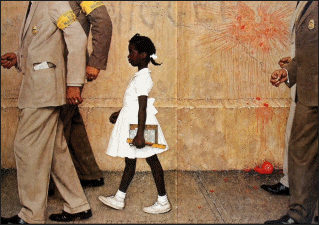
January 14, 1964
Yesterday’s Supreme Court decision about the 1965 Voters Right Act was all over the news last night, bringing up things that have been an important part of my own life for as long as I can remember. Watching, I didn’t feel the old fire in the belly I’m used to feeling. What caught my attention were the old newsreels of some of the horrible things that happened in those years and I realized that what I was feeling was something like nostalgia – which struck me as peculiar. I can assure you that there was nothing warm and fuzzy about those times here in the South. This morning, my reaction last night came back to me while I was looking over a Norman Rockwell retrospective a friend sent, I was thinking that Rockwell was the master of nostalgia, even at the time those terrible things were happening – which makes absolutely no sense, if you think about it. It’s not a feeling associated with contemporary things. When I came across this one, I thought – his paintings are timeless. That must be his magic:
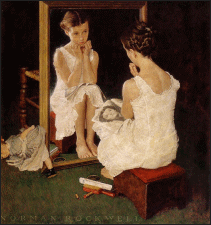
But I felt nostalgia looking at that picture too. And I was never a young girl holding a picture of a movie star wondering what kind of woman was going to come from what I saw in the mirror. Then, I discovered what I bet a bevy of art critics saw a long time ago. It’s the children. The majority of Rockwell’s pictures had children in them, and those are the characters we connect with in those images. I can almost remember being the young boy on the left in this one,even though I was younger when it was painted:
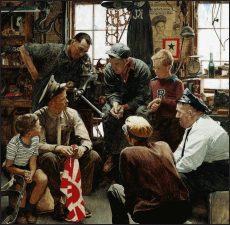
Norman Rockwell saw the world through the eyes of children, and included both the kids and their perspective in every painting. And it’s no leap to see why I felt nostalgia watching those old newsreels on the news last night. I was remembering being a much younger me marching scared down some of those angry streets myself and what that felt like. From the safety of the present future, I felt a nostalgia for the me that was then. And I thought of something that I had found perplexing as a child – my parents fond memories of growing up in the depths of the Depression or leaving college about the time World War II turned their world upside down once again. It was the worst of times, but they were remembering being themselves as they were then, fondly. And as much as I was enjoying thinking about Norman Rockwell and his world, I probably would’ve kept these meandering thoughts to myself, but then I saw the next two paintings:
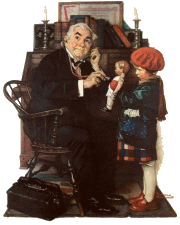
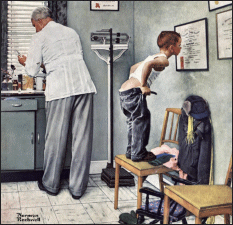
My reaction was muted, perhaps even uneasy. Oh, I recall the kind old doctor on the left, meeting his patient at the level of her concerns. And I sure remember questioning the wisdom of a hypodermic needle. Children don’t get the concept of Aesculapean authority – as in even though it may be painful, the doctor is doing it in your best interests. I know that my encounters with these figures in childhood shaped my future in more ways than I can ever realize. And as a sickly kid, I had plenty of experience. But that part feels warmly nostalgic. The muted, uneasy part comes from the present.
But first, there was something else from childhood. It wasn’t lost on me that adults lied. They sat around and told nostalgic stories and invariably ended up with "the good old days," talking about how much better things had been in the past – better values, better people, better government, etc. My Dad grew up as a poor immigrant in a coal mining town run by warring immigrant gangs. My mother told of having a cross burned in her yard and moving towns when her father quit the Klan. So I would sit in wonderment about what was so good and pure about those "old days." And, by the way, they were saying my days weren’t the good days, which pissed me off. I thought my days were just fine. So I resolved that when and if I ever became an adult, I wouldn’t lie about the "good old days" [of the Cold War, the Civil Rights days, Viet Nam, Watergate, etc].
And mostly, in spite of the monotonous moaning on the evening news, I think these are "good days." But against the current of my youthful resolution, I worry that I came along in the last "good old days" of doctoring. It’s not just the clowns like Trivedi and Nemeroff for whom Conflict of Interest is a profession. It’s not even just psychiatry. If you’re an old retired doctor in a community, the phone rings a lot and you end up going to the Emergency Room with a lot of people. I don’t like what I see there. And I don’t like the stories I hear about a lot of medical care.
Perhaps there is an appropriate bit of nostalgia for the times when “dreams” for the future were bold?
Though those can backfire— in my late twenties I realized that a lot of my disappointment with the human race could be traced back to the sixth grade when were being told that there would be an end to hunger, and war, and racism, and sexism, and…
…and I believed it.
Looking forward to a better future (see Nemeroff) can be as much of a lie as the lie of a better past.
Norman Rockwell’s personal life was not so picture-perfect.
Like all of us, he had his share of suffering to deal with. His second wife (he was married 3 times), Mary Barstow suffered from severe bouts of depression and was hospitalized; ECT was used. She abused alcohol and prescription drugs and apparently suffered a great deal in life. –
http://marriage.about.com/od/thearts/a/normanrockwell_4.htm
I too grew up in a segregated south. Treatment of blacks was not pretty. Thank God this country passed the Civil Rights Act.
We now need to protect people from forced psychiatric treatment without due process of law. –
http://www.psychrights.com
Duane
Correction –
http://www.psychrights.org
Duane
Wiley,
A fine point. The ‘future-think’ of our KOLs, including Tom Insel at the NIMH and Jeffrey Lieberman at the APA to wit. Fortunately, it’s wearing mighty thin…
Thanks Dr. Mickey. All of us change and change again with time, and there’s no use getting sentimental. Yet it’s important to know that if your twentysomething self were to meet your fiftysomething self on the street, your twentysomething self would not puke his guts out. Not everyone can say that but you can.